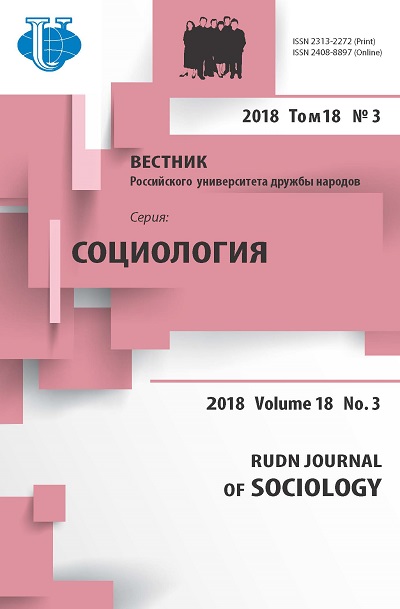POLITICAL VALUES OF THE RUSSIAN SOCIETY (results of the comparative research)
- Authors: Ivanov VN1, Nazarov MM1, Kublitskaya EA1
-
Affiliations:
- Institute for Social and Political Studies of the Russian Academy of Sciences
- Issue: Vol 18, No 3 (2018)
- Pages: 470-480
- Section: Surveys, experiments, case studies
- URL: https://journals.rudn.ru/sociology/article/view/19183
- DOI: https://doi.org/10.22363/2313-2272-2018-18-3-470-480
- ID: 19183
Cite item
Full Text
Abstract
The article presents the results of the comparative study of political-ideological views of the Russian population on the values of freedom, democracy, social justice, the role of the state, etc. The research covers almost a quarter of a century - the surveys based on the same questionnaire were conducted among Muscovites in 1992 and 2016. The results of the comparative study show that the structure of the views on basic political values has not changed significantly. However, there are still different, often opposite social-political representations in the Russian society, which is clearly manifested when opposing freedom and inequality, democracy and socialism, social justice and individualism. Moreover, the shares of respondents expressing opposite views are approximately equal. At the same time, the attitudes structure revealed at the end of the last century has changed if compared to the data of 2016 survey, especially considering the role of individual activities in determining life trajectories. There is growing support for the importance of individualism as opposed to social justice and for the expectations of various types of state social guarantees. The results of the multidimensional statistical classification prove that there are several groups with different political-ideological orientations - from supporters of liberal democratic ideas to those who prefer socialist values. However, most groups still support the paternalistic ideas of the Soviet period such as the importance of social guarantees and social role of the state.
About the authors
V N Ivanov
Institute for Social and Political Studies of the Russian Academy of Sciences
Author for correspondence.
Email: vilen_ivanov@bk.ru
-
Fotieva St., 6-1, Moscow, 119333, RussiaM M Nazarov
Institute for Social and Political Studies of the Russian Academy of Sciences
Email: vy175867@yandex.ru
-
Fotieva St., 6-1, Moscow, 119333, RussiaE A Kublitskaya
Institute for Social and Political Studies of the Russian Academy of Sciences
Email: eakubl@yandex.ru
-
Fotieva St., 6-1, Moscow, 119333, RussiaReferences
- Byzov L.G. Kontury novorusskoj transformatsii. Sociokulturnye aspekty formirovaniya sovremennoj rossijskoj natsii i evolyutsiya socialno-politicheskoj sistemy [Shapes of the New Russian Transformation. Social-Cultural Aspects of the Contemporary Russian Nation Formation, and the Evolution of Social-Political System]. Moscow: ROSPEN, 2013 (In Russ.).
- Gudkov L. Socialnyj kapital i ideologicheskie orientatsii [Social capital and ideological orientations]. Pro et Contra. 2012; May-June: 6—31 (In Russ.).
- Nazarov M.M. Tipy politicheskogo soznaniya (Moskva, seredina 1991 g.) [Types of political consciousness (Moscow, mid-1991)]. Sociologicheskiye Issledovaniya 1992; 6: 64—71 (In Russ.).
- Narbut N.P., Trotsuk I.V. Socialnoe samochuvstvie molodezhi postsocialisticheskih stran (na primere Rossii, Kazahstana i Chehii): sravnitelnyj analiz tsennostnyh orientsatij (Chast 1) [The social well-being of the post-socialist countries’ youth (on the example of Russia, Kazakhstan and Czech Republic): Comparative analysis of value orientations (Part 1)]. RUDN Journal of Sociology. 2018; 18 (1): 131—155 (In Russ.).
- Nenashev M.F. Illyuzii svobody. Rossijskie SMI v epohu peremen (1985—2009) [Illusions of Freedom. Russian Media in the Era of Transition]. Moscow: Logos; 2010 (In Russ.).
- Nikiforov A.R. Psihologicheskij analiz politicheskih tsennostej v strukture partijnyh ideologij [Psychological analysis of political values within the parties’ ideologies]. Vestnik Moskovskogo Universiteta. Seriya 12: Politicheskie Nauki. 2013; 4: 19—29 (In Russ.).
- Selezneva A.V. Metodologiya issledovaniya politicheskih predstavlenij i tsennostej [Methodology of the political views and values research]. Vestnik Moskovskogo Universiteta. Seriya 12: Politicheskie Nauki. 2011; 2: 42—53 (In Russ.).
- Selezneva A.V. Rossijskoe obschestvo v postsovetskij period: dinamika tsennostnyh izmenenij elity i grazhdan [Russian society in the post-Soviet period: The dynamics of changes in the values of the elite and citizens] Politicheskaya Nauka. 2016; S: 149—169 (In Russ.).
- Trotsuk I.V., Sokhadze K.G. Tsennostnye orientatsii molodezhi: podhody, metodiki i zadachi sociologicheskogo analiza [The youth’s value system: Approaches, techniques, and objectives of the sociological analysis]. Teoriya i Praktika Obschestvennogo Razvitiya. 2015; 20 (In Russ.).
- Havenson T.E., Migol E.V. Socialno-professionalnyj status i politicheskie tsennosti Rossii, Germanii, SShA (sravnitelnyj analiz) [Social-professional status and political values in Russia, Germany, and the USA: A comparative analysis] Sociologicheskiye Issledovaniya. 2011; 9: 61—72 (In Russ.).
- Conover P.J., Feldman S. Origins and meaning of liberal/conservative self-identifications. American Journal of Political Science. 1981; 25: 617—645.
- Converse Ph. The nature of belief systems in mass politics. Apter D. (Ed.). Ideology and Discontent. New York: Free Press of Glencoe; 1964.
- Heath A., Evans G., Martin J. The measurement of core beliefs and values: The development of balanced socialist/laissez faire and libertarian/authoritarian scales. British Journal of Political Science. 1994; 24: 115—133.
- Narbut N.P., Trotsuk I.V. Comparative analysis as a basic research orientation: Key methodological problems. RUDN Journal of Sociology. 2015; 4: 7—19.
- Nie N., Verba A., Petrocik J. The Changing American Voter. Cambridge: Harvard University Press; 1976.
Supplementary files













